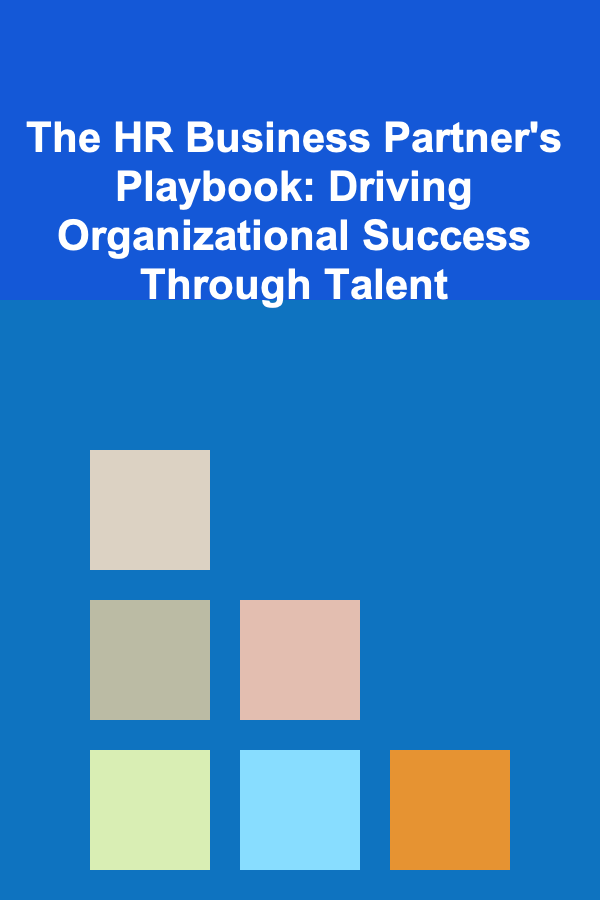10 Tips for Tracking Interview-Related Expenses
ebook include PDF & Audio bundle (Micro Guide)
$12.99$9.99
Limited Time Offer! Order within the next:
Job interviews are a critical aspect of both a candidate's and a company's journey. For candidates, an interview often marks the first step toward securing a new job opportunity, while for companies, it's a process of evaluating talent and fit for organizational needs. However, job interviews, particularly when they require travel or other costs, can accumulate a significant amount of expenses.
For job seekers, particularly those who are actively applying to multiple positions, tracking interview-related expenses becomes crucial for personal financial management and budget planning. Companies, on the other hand, need to account for their own costs associated with interviewing candidates---such as travel reimbursements or administrative costs.
In this article, we will explore 10 practical tips to help both job seekers and employers track interview-related expenses effectively. Whether you're looking to keep your job-search costs in check or ensure accurate reporting for your business, these tips will provide valuable insights.
1. Categorize Interview-Related Expenses
The first step to tracking interview-related expenses is to create clear categories for the various costs that may arise during the process. This not only ensures that you keep a detailed record but also helps in organizing the data in a way that makes it easy to understand and manage.
For job seekers, the typical categories might include:
- Travel Costs: Expenses such as flights, train tickets, taxis, or car rentals.
- Accommodation Costs: Hotel stays or Airbnb bookings for out-of-town interviews.
- Meals: Dining costs during travel or after the interview.
- Interview Preparation Costs: Expenses like professional clothing, grooming, or any materials needed for the interview (e.g., portfolio printing).
- Miscellaneous Costs: Anything that doesn't fit into the main categories, such as parking fees or tolls.
For employers, interview-related expenses might fall into these categories:
- Candidate Travel Reimbursement: Costs covered for candidates' travel expenses.
- Venue Costs: Renting space for the interview.
- Administrative Expenses: The cost of scheduling, preparing materials, or paying staff to conduct interviews.
- Technology Costs: Expenses related to virtual interviews, such as software subscriptions or video conference equipment.
By categorizing expenses, you can easily track and manage them without getting overwhelmed by the details.
2. Maintain a Centralized Record System
Whether you're a job seeker or an employer, keeping all your interview-related expenses in one place is essential. Use a spreadsheet, a budgeting app, or accounting software to record each transaction. Here are some effective methods:
- Spreadsheets: Simple and effective, spreadsheets like Google Sheets or Excel allow you to create custom columns for categories such as date, expense type, amount, and payment method.
- Expense Tracking Apps: Tools like Expensify, Mint, or YNAB (You Need a Budget) can help you capture your expenses in real time and automatically categorize them.
- Accounting Software: If you're managing interview costs for a company, using accounting software like QuickBooks or Xero will provide more comprehensive and automated tracking options.
Keep all receipts, invoices, or confirmations associated with these expenses in digital or physical form to ensure you have documentation for every transaction.
3. Track All Expenses in Real-Time
One of the easiest ways to forget an interview-related expense is to wait until the end of the week or month to record it. Whether you're a job seeker or an employer, tracking expenses in real-time will keep your records accurate and complete.
For job seekers, if you're on the go, it's best to enter expenses as soon as you incur them. Take a photo of receipts or log the costs into your tracking system right away. If you're attending multiple interviews in a short time frame, this will help you avoid confusion when it's time to calculate your total expenses.
For employers, assigning someone to track expenses as they happen ensures that no cost is overlooked. For instance, if a candidate's travel expenses are reimbursed, record this as soon as the payment is made. The real-time recording also makes it easier to reconcile any discrepancies or errors in the reporting.
4. Set a Budget for Interview Expenses
Before diving into the interview process, it's wise to set a budget. Both job seekers and employers benefit from having a financial plan that outlines how much can reasonably be spent on each category of interview-related costs.
- For job seekers: Setting a clear budget helps manage expectations and keeps you from overspending. For example, decide in advance how much you're willing to spend on travel and accommodation per interview or per job search.
- For employers: Set a maximum reimbursement limit for travel costs or other interview-related expenses. This ensures that you stay within the company's budget and avoid over-compensating candidates for minor costs.
5. Utilize Credit or Debit Cards for Easier Tracking
Using a dedicated credit or debit card for interview-related expenses can simplify tracking. With credit card statements, you can instantly view your spending on interview-related costs, and many financial apps can automatically categorize these transactions.
For job seekers, using a separate card for these expenses can also help with budgeting. It will make it easy to track how much you're spending on job-search-related activities and keep your personal finances separate.
For employers, providing employees with a company credit card to cover interview-related costs ensures that all expenses are documented and can be easily reviewed in the company's financial statements.
6. Use Receipts for Verification
Always request receipts for any purchase related to the interview process. Receipts serve as proof of the transaction and can be vital for your records.
For job seekers, this means saving receipts for flights, meals, and any other costs you incur while preparing for or attending interviews. You can either keep physical copies or take digital photos of the receipts for easy uploading into your tracking system.
For employers, ensuring that candidates provide receipts for any reimbursable expenses creates a paper trail for audit purposes and guarantees that reimbursements are appropriate.
7. Track Travel Reimbursements Carefully
For job seekers, travel expenses can add up quickly, especially if you're attending multiple interviews in different cities. Consider keeping a detailed log of your travel, noting the purpose of the trip, the mode of transportation, and the specific costs. If your future employer offers to reimburse you for travel costs, having this information in one place will help you request reimbursement more efficiently.
Employers should have a clear policy for reimbursing candidates for travel expenses. Ensure that the candidate submits all required receipts and follows the company's process for submitting travel expenses. Clearly communicate the terms of reimbursement, including any limits or restrictions.
8. Consider Tax Deductions for Interview Expenses
Job seekers, in some countries, may be able to deduct certain job-search expenses from their taxable income. For example, travel, meals, and preparation costs may be deductible depending on your jurisdiction. Check with a tax professional to understand what expenses you can deduct during your job search.
Employers should also consider the tax implications of reimbursing interview-related expenses. In many countries, certain expenses may be tax-deductible as part of the company's operating costs. It's important to keep accurate records for tax reporting purposes.
9. Periodically Review Your Spending
For both job seekers and employers, periodically reviewing your interview-related expenses can help identify areas where you can cut costs or optimize your budget.
- For job seekers: Take a moment to review your expenses after every interview. For instance, if you're attending interviews in the same city, you may be able to combine trips to minimize costs.
- For employers: Regularly review candidate reimbursements to ensure they align with company policies and that no expenses are going unaccounted for.
10. Keep an Eye on the Bigger Picture
Interview expenses are often a small part of your overall financial picture, but they can have a significant impact on your budget or company's bottom line.
- For job seekers: Be mindful of how much you're spending on job searches, and ensure that your job-search expenses don't outweigh your potential earnings.
- For employers: Monitor the costs associated with interviewing and ensure that the recruitment process remains efficient. High interview-related expenses may indicate that you need to reassess your recruitment strategy.
Conclusion
Tracking interview-related expenses is essential for both job seekers and employers. By categorizing expenses, using tracking systems, setting budgets, and maintaining thorough records, you ensure that your financial resources are managed efficiently. Proper tracking can also reduce the likelihood of errors, prevent overspending, and provide clarity during the job search or hiring process.
For job seekers, managing these expenses allows you to stay within budget while remaining competitive in the job market. For employers, monitoring interview expenses ensures cost control and supports effective financial planning within the hiring process.
Reading More From Our Other Websites
- [Home Budget Decorating 101] How to Add Character to Your Home with Affordable Decor Pieces
- [Organization Tip 101] How to Design a Vertical Garden to Save Space
- [Organization Tip 101] How to Create a Sustainable Digital Filing System
- [Personal Investment 101] How to Use an Investment Calculator for Financial Planning
- [Whitewater Rafting Tip 101] High vs. Low: Choosing the Best River Conditions for Safe Rafting
- [Personal Care Tips 101] How to Achieve a Post-Workout Refresh with Personal Care Tips
- [Home Cleaning 101] How to Clean and Maintain Your Leather Furniture
- [Home Budget 101] How to Reduce Home-Related Expenses During the Holiday Season
- [Organization Tip 101] How to Reflect on the Importance of Organization in Summer Camp Success
- [Home Security 101] How to Protect Your Home During a Power Outage

How to Create a Meal Prep Community for Support
Read More
How to Maintain Your Home's Home Theater and Audio Systems
Read More
How to Make Money Online as a Back-End Developer: 10 Actionable Ideas
Read More
The HR Business Partner's Playbook: Driving Organizational Success Through Talent
Read More
Unlocking Game Development Secrets: Techniques and Technologies for the Next Generation of Game Masters
Read More
How to Edit Historical Documents Like a Pro
Read MoreOther Products

How to Create a Meal Prep Community for Support
Read More
How to Maintain Your Home's Home Theater and Audio Systems
Read More
How to Make Money Online as a Back-End Developer: 10 Actionable Ideas
Read More
The HR Business Partner's Playbook: Driving Organizational Success Through Talent
Read More
Unlocking Game Development Secrets: Techniques and Technologies for the Next Generation of Game Masters
Read More